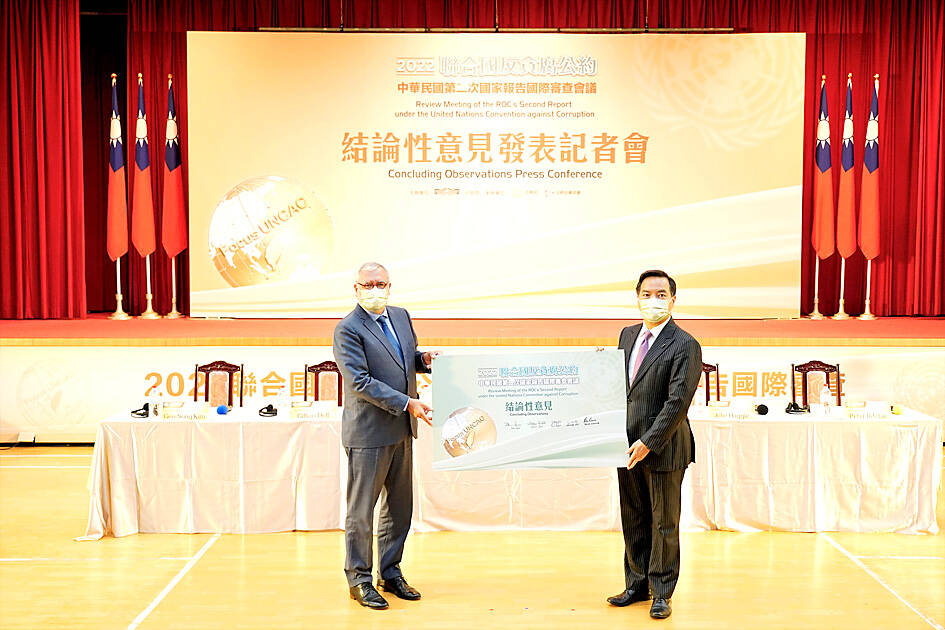International experts on Friday commended Taiwan’s progress on fighting corruption and made more than 100 recommendations, although they said there is room for improvement regarding implementation of the UN Convention Against Corruption.
The international panel for Taiwan’s second report under the convention comprised five experts and was chaired by Peruvian attorney and professor Jose Ugaz during the four-day meeting intended to review Taiwan’s progress in adhering to the UN treaty.
The process began in 2015 when Taiwan adopted the convention in law, despite not being a UN member.

Photo courtesy of the Agency Against Corruption via CNA
Also on the panel was Transparency International head of conventions Gillian Dell; Transparency International New Zealand CEO Julie Haggie; former Transparency International South Korea chair Kim Geo-sung; and Australia’s ABA Rule of Law Initiative regional anti-corruption adviser Peter Ritchie.
The panel conferred with legislators, government officials and judiciary agency delegates, and met with civil society groups and other organizations. They also delivered parallel reports on Taiwan\'s anti-corruption efforts.
Ugaz said that he was in Taiwan in March 2018, when the first report meeting was held to monitor Taiwan’s progress on meeting the convention obligations.
“Taiwan has developed an amazing anti-corruption political will and a unique interaction between government, academia and civil society to confront this phenomenon,” the panel said in its closing statement.
The government “has demonstrated substantial international cooperation against corruption and other crimes,” it said.
However, further progress can be made in partnering with organizations and developing countries by sharing skills and knowledge in areas of money laundering and mutual legal assistance, it added.
Taiwan has implemented “an impressive range of corruption prevention legislation” since the first report, it said.
Taiwan has made legislative amendments to improve procurement transparency and accountability, and bolster regulation of the private sector to improve corporate governance.
The panel also mentioned Taiwan’s money laundering prevention efforts and its limits on government lobbying and political donations.
“We want to congratulate the government of Taiwan for its latest demonstration of its commitment to the anti-corruption cause and express our sincere gratitude for the opportunity to contribute to the review process,” the panel said.
“We are sure this commitment will result in a better and transparent country for the benefit of the people of Taiwan and the generations to come,” it added.
The panel listed some challenges Taiwan faces, including: the need for an independent body to consider requests under the Freedom of Government Information Act (政府資訊公開法); increasing anonymous reporting channels across public and private sectors; and implementing a central register that identifies who controls private entities.
Taiwan could also improve in political donation transparency and setting donation limits, and abolishing offset clauses in future defense acquisition to ensure the integrity of the defense procurement, as the majority of G20 countries have done, it said.

A Vietnamese migrant worker on Thursday won the NT$12 million (US$383,590) jackpot on a scratch-off lottery ticket she bought from a lottery shop in Changhua County’s Puyan Township (埔鹽), Taiwan Lottery Co said yesterday. The lottery winner, who is in her 30s and married, said she would continue to work in Taiwan and send her winnings to her family in Vietnam to improve their life. More Taiwanese and migrant workers have flocked to the lottery shop on Sec 2 of Jhangshuei Road (彰水路) to share in the luck. The shop owner, surnamed Chen (陳), said that his shop has been open for just

Global bodies should stop excluding Taiwan for political reasons, President William Lai (賴清德) told Pope Francis in a letter, adding that he agrees war has no winners. The Vatican is one of only 12 countries to retain formal diplomatic ties with Taiwan, and Taipei has watched with concern efforts by Beijing and the Holy See to improve ties. In October, the Vatican and China extended an accord on the appointment of Catholic bishops in China for four years, pointing to a new level of trust between the two parties. Lai, writing to the pope in response to the pontiff’s message on Jan. 1’s

TAKE BREAKS: A woman developed cystitis by refusing to get up to use the bathroom while playing mahjong for fear of disturbing her winning streak, a doctor said People should stand up and move around often while traveling or playing mahjong during the Lunar New Year holiday, as prolonged sitting can lead to cystitis or hemorrhoids, doctors said. Yuan’s General Hospital urologist Lee Tsung-hsi (李宗熹) said that he treated a 63-year-old woman surnamed Chao (趙) who had been sitting motionless and holding off going to the bathroom, increasing her risk of bladder infection. Chao would drink beverages and not urinate for several hours while playing mahjong with friends and family, especially when she was on a winning streak, afraid that using the bathroom would ruin her luck, he said. She had

MUST REMAIN FREE: A Chinese takeover of Taiwan would lead to a global conflict, and if the nation blows up, the world’s factories would fall in a week, a minister said Taiwan is like Prague in 1938 facing Adolf Hitler; only if Taiwan remains free and democratic would the world be safe, Deputy Minister of Foreign Affairs Francois Wu (吳志中) said in an interview with Italian newspaper Corriere della Sera. The ministry on Saturday said Corriere della Sera is one of Italy’s oldest and most read newspapers, frequently covers European economic and political issues, and that Wu agreed to an interview with the paper’s senior political analyst Massimo Franco in Taipei on Jan. 3. The interview was published on Jan. 26 with the title “Taiwan like Prague in 1938 with Hitler,” the ministry